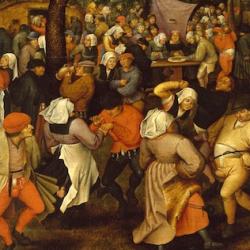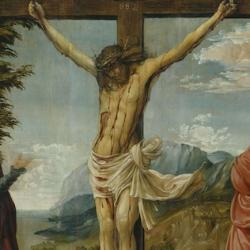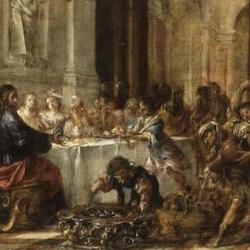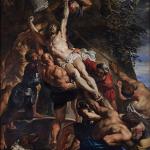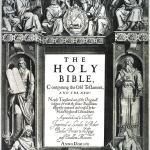On the Sabbath after the last day of the Feast of Booths, Jesus has an intense debate with Jewish leaders in Herod’s temple, climaxing with Jesus’ declaration, “Before Abraham was, I am.” The Jews have recently been eager to execute an adulteress. Now they’ve found a new target, a blasphemer, and they search the ground for stones to pelt at Jesus.
As He slips away, Jesus passes a man blind from birth. He stops, spits on the ground, makes clay to christen the man’s eyes, and sends him off to wash in the pool of Siloam. When the man returns, he can see but he can’t see Jesus because Jesus is gone.
Since it’s a Sabbath day, everyone turns to the Pharisees for a legal judgment about what Jesus did. The Pharisees are in a spot: They’ve already decided Jesus is a sinner who breaks Sabbath, but they can’t deny the man can see. It takes some ingenuity to run a trial when you start with a predetermined verdict, and all the evidence is against you.
They try to break the man’s dogged adherence to the facts. When they can’t, they turn to his parents. Perhaps, they think, the man is a plant, part of a vast Jesus conspiracy. Alas, the parents are no help. They’re too afraid of the Pharisees to say Jesus healed their son, but they know he was born blind.
Frustrated, the Pharisees resort to brute power. They can’t let the man stay. So long as he is in the synagogue, even if he is only standing silently in a corner praising God for his sight, he’s a continuing witness to Jesus, and an offense to the Pharisees. Left with nothing substantive, they “revile” the man, accuse him of arrogance for trying to teach them, and impose a confession of faith so they can justify kicking him out of the synagogue.
While the Pharisees are marching steadily into darkness, the blind man progresses from literal and spiritual blindness through several stages of semi-illumination until he embraces and falls before the Light. At first, he knows only Jesus’ name. Under pressure from the Pharisees, he confesses Jesus is a prophet.
After the Pharisees interview his parents, they return for a second interview with the man, and in the meantime he’s gotten bolder. He presents an airtight argument: God doesn’t hear sinners; Jesus performed an unprecedented sign by God’s power; therefore Jesus cannot be a sinner. Why can’t these well-educated Pharisees see it? Logic – have they never taken logic? (“What do they teach children at school these days.”)The blind receives more than sight; he’s given deeper and deeper insight.
With insight comes irony. He sees through the Pharisees’ bullying and bluster, and he turns into a classical eiron, sarcastically asking the Pharisees if they want to become disciples of Jesus. The joke’s on them, and we on-looking readers snicker behind the backs of the clumsy Pharisees. It’s fun to see Jesus stymie them; it’s delicious to see them driven from the field by a beggar!
Then we’re brought up short. How did we come to see these things in this story? How did we come to laugh at the Pharisees’ expense? We did it by poring over the text, examining nuances of language, twists in the plot, the rise and fall of different characters. We’ve read some articles and commentaries. We’ve examined the text as exegetes and theologians, listening to other exegetes and theologians. Then we realize the only exegetes and professional theologians in the story are the Pharisees.
The joke’s on the scribes; but we can see the joke only by becoming scribes. We thought the joke was on them, but we realize with a start that the joke’s on us.
Here we get to the moral of my retelling of the story of the blind man, which is equally the story of Pharisees: Formal theological study is one of the most spiritually dangerous endeavors one can take on.
It’s not dangerous for all the romanticized reasons we like to might think it dangerous. It’s not dangerous because theologians face down the world, the flesh, and the devil. Apart from the very rare Luther or Machen or de Lubac, the world, the flesh, and the devil have more strategic uses of their energies. The devil knows most theologians can be safely ignored.
It’s not dangerous because theologians are in the infantry of the church militant either. Theologians and theology students are typically watching from a comfortable window-box high above the field where players stand a real risk of getting hurt.
Studying theology is dangerous because, from what we can see in the Bible, experts in theology are more apt than others to form little smug societies for the enhancement of mutual honor. Earlier in John’s gospel, Jesus identified the reason for the Jews’ unbelief: “How can you believe, when you receive glory from one another, and you do not seek the glory that is from the one and only God?” (
The Pharisees read and footnote each other’s books and journal articles, confer honorary degrees on one another, devote themselves to a single-minded pursuit of tenure so they can receive glory from other tenured theologians. They impose a brutal knowledge regime on their colleagues, ignoring dissenters when they can and excising them when they can’t. When they run out of arguments, they turn to insults and finally take away the union card.
Don’t think it won’t happen to you. The greatest danger is for those called to spend their lives studying and teaching theology. But whatever you plan to do with your study, your training will tempt you to become a Pharisee. When some superstitious old woman gently reminds you of some basic truth of the gospel, you’ll be tempted to object, “Yes, but the Greek says. . . .”
When an untrained nobody wants to teach you something, you’ll be tempted to respond Pharisaically, “You want to teach me?” And if he persists, you’ll be relieved he’s not part of your little club.
We can be inoculated to this temptation by worship. Jesus repeatedly contrasts the honor that comes from God and the honor that comes from men. Giving glory to and seeking glory from the Father must be the center of theological study. If it’s not, theological expertise can only turn rancid.
So, give glory to God, and seek it from Him.
But we need to know where to find that glory, and the story of the blind man tells us that too. After Jesus gives instructions to the blind man to wash in Siloam, He disappears from the story. It’s His longest absence in John’s gospel. He doesn’t reappear until the man is cast out of the synagogue. There he sees Jesus for the very first time, and worships.
Until you’re ready to be cast out of the synagogue, you aren’t ready to study theology. And you won’t risk being cast out unless you’re convinced that true glory is outside, in the sunlight. You won’t risk being cast out unless you know you’ll find Jesus, the living Glory of the Father, just over the threshold.


